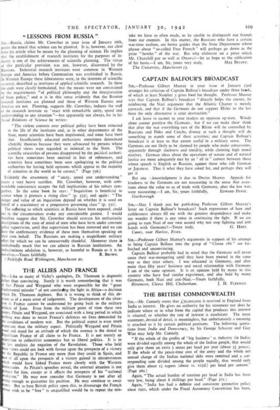LESSONS FROM RUSSIA ".
siR.—Russia, claims Mr. Crowther in your issue of January r6th, points the moral that science can be planned. It is, however, not clear from his article what he means by the planning of science. He implies that the establishment of research institutes for the purposes of in- dustry is one of the achievements of scientific planning. The virtue of this particular provision was not, however, discovered by the Russians. Industrial research institutes were common in Western Europe and America before Communism was established in Russia. In Western Europe 'these laboratories were, in the interests of scientific accuracy, described as institutes of applied scientific research. In these the ends were clearly formulated, but the means were not constrained by the requirements "of political philosophy and the interpretation of State policy," and it is in this sense evidently that the Russian research institutes ar•e planned and those of Western Europe and America are not. Planning, suggests Mr. Crowther,, induces the staff of the research institute to ' react with remarkable unity, speed 'and understanding to any situation "—but apparently not always, for in his Social Relations of Science he writes:
" The violent contests over political policy have been reflected in the life of the institutes and, as in other departments of the State, many scientists have been imprisoned, and some have been shot. Insufficiently educated enthusiasts sometimes denounced scientific theories because they were advocated by persons whose political views were regarded as inimical, to the State. The scientific researches of persons disapproved by the political authori- ties have sometimes been omitted in lists of references, and scientists have sometimes been seen apologising to the political authorities for having held opinions which appear to the majority of scientists in the world to be correct." (Page 556.)
Evidently the attainment of " unity, speed and understanding " exacts a very heavy sacrifice. Mr. Crowther, however, with com- mendable consistency accepts the full implications of his robust sym- pathies. In the same book he says: " Inquisition is beneficial to science when it protects a rising class " (p. 333), and again: " The anger and value of an inquisition depend' on whether it is used on behalf of a reactionary or a progressive governing class " (p. 331).
The suffering to which scientists in Russia have been exposed, could of in the circumstances evoke any considerable protest. I would herefore suggest that Mr. Crowther should restrain his enthusiastic scriptions of the state of mind of .men who have be-n under constant ice supervision, until that supervision has been removed and we can ace the confirmatory evidence of these men themselves speaking on eir own .behalf. The Russians are making a magnificent military ifort for which we can be unreservedly thankful. Moreover there if ndoubtedly much- that we can admire in Russian institutions. An ndiscriminate adulation is, however, as harmful to• Russia as it is to selves.—Yours faithfully. R. BROwN. 7 Redclyffe Road, Withington, Manchester 20.


























 Previous page
Previous page